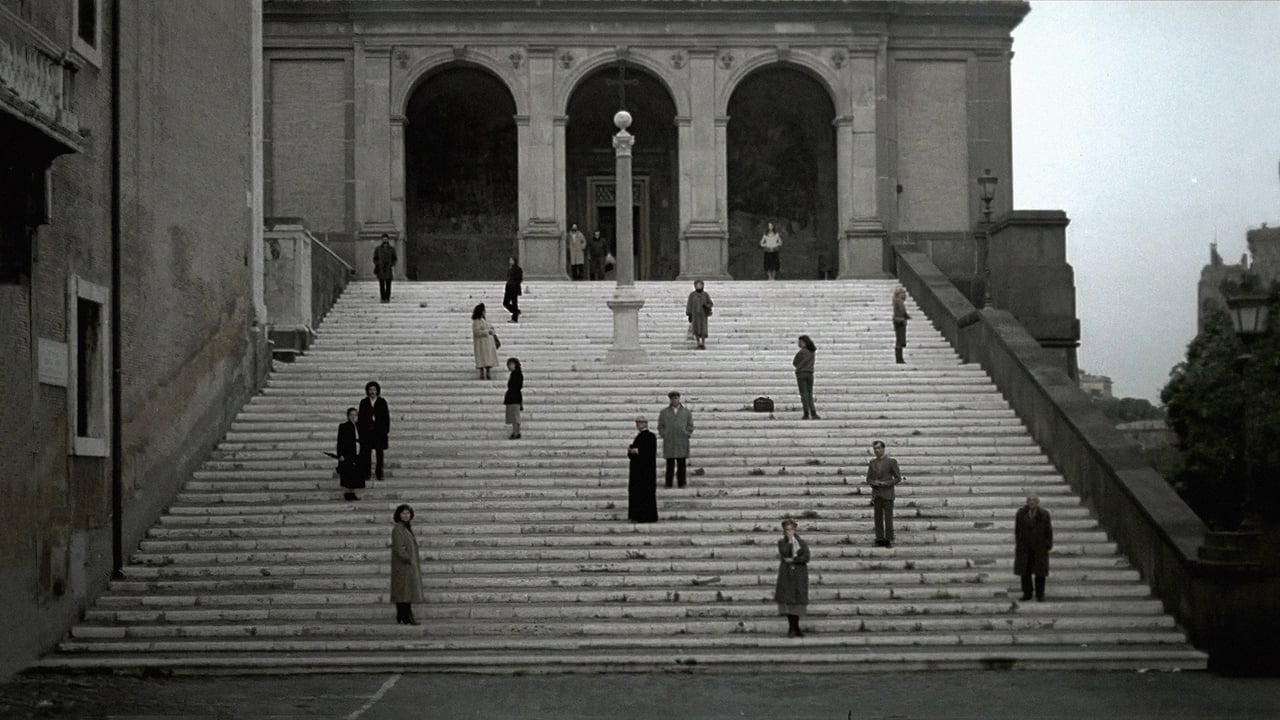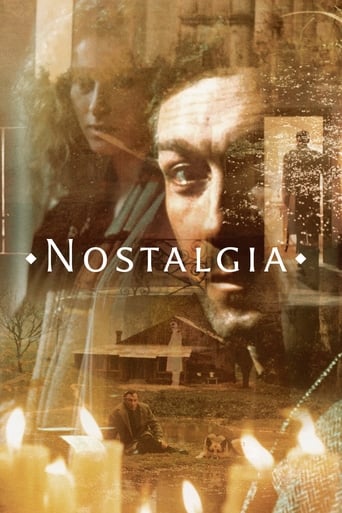

This is How Movies Should Be Made
... View MoreBest movie of this year hands down!
... View MoreExcellent and certainly provocative... If nothing else, the film is a real conversation starter.
... View MoreI think this is a new genre that they're all sort of working their way through it and haven't got all the kinks worked out yet but it's a genre that works for me.
... View MoreTarkovsky: you either love him or hate him. It's imperative to understand that Tarkovsky is more about mood and imagery than strong driving narrative, although it's untrue that this film lacks narrative (unlike Mirror which is simply a collection of scenes). The story is there in Nostalgia: the characters are all real and fight for their needs and wants - there is conflict. But Tarkovsky is more interested in the feeling of the story rather than clearly communicating plot information and keeping you locked into classical narrative structure.VERY few filmmakers can do this well, and countless filmmakers try to imitate Tarkovsky and miserably fail, partly because they don't understand that there is a real story happening here - it's just presented in a way that is highly allegorical. This is definitely not 'lazy' filmmaking, or style covering for a lack of technique (Tarkovsky was a highly literate man who could run circles around most Hollywood scriptwriters, and he had the services of Antonioni's screenwriter for Nostalgia). He is simply one of the very few filmmakers who can make a good film without adhering to classical narrative film structure.As is traditional for Tarkovsky, the actors are all top notch, the cinematography is divine, the sound design is intentional and the music is very judiciously chosen. Nothing is left to chance. And yes, of course there is plenty of water, as with his other films! Would I have enjoyed a more traditional narrative format for a film like this? Yes, which is why I gave this film only seven stars. Tarkovsky could have done a bit more to keep us involved in the story without compromising the mood he was building. But I still gladly accept this film for what it is - it has some absolutely magical, brilliant moments that forever stay in your mind.If you're new to Tarkovsky, it's probably a better idea to start with some of his more accessible films, such as Ivan's Childhood and Solaris.
... View MoreBefore making an art house film check the following ingredients:A lot of camera movements behind pillars, columns and walls Add a lot of fog and smoke to create a mystic mood During dialogue film the person speaking on his back or don't show people at all Don't forget a little bit of nudity from the leading female character but not too much to avoid vulgarity Make sure there is a plot but don't use it during the film And of course the madman who turns out to be the wisest man on earthNostalghia is the kind of film that uses this and other clichés of art house in such a way that the movie is boring as hell. The plot is about a Russian poet looking for traces of a Russian composer who lived in Italy some centuries before. We learn nothing specific about the poet and the composer except that they both suffer from homesickness. And of course the director projects his own longing for Russia on his protagonist and the object of his study. The only thing that saves the film is the talent of Tarkovsky to shoot beautiful scenes. There is a camera movement from an arcade to a healing pool that is absolutely breathtaking. The scene where the poet is in the house of the madman and the rain is pouring through the roof is gorgeously filmed. And I never will forget the scene where the madman is standing on the statue of a Roman emperor and his horse (sorry, I'm too lazy to look up the name of the emperor) and shouting his thoughts to an apathetic crowd. Those scenes are worth it to watch over and over again but you have to suffer all the other endless scenes with static camera where absolutely nothing happens or nothing interesting is said.One of the strangest incidents taking place is the suicide of the madman. I missed the clue why this should be in the script completely. Except for that Tarkovsky would show us how people are manipulated and used for other people's agenda. But it has nothing to do with the main theme which is the longing for your home ground. The final scenes where the poet is fulfilling a promise to the madman and finally collapse because of a failing heart are beautiful. A lot had been said about the final scenes were the poet is shown in front of his house in Russia which is placed in the ruin of an Italian cathedral. His love for both worlds are united here as he reached his heaven.Tarkovsky showed us a lot of things in this film what made him a unique director. For its screenplay (also by Tarkovsky) this movie is much less successful. I was left with the feeling that a chance of a masterpiece was missed here.
... View MoreNo, not by me. A review can only be something about myself.25 years after my experience with "Zerkalo" I wrote a late review here, and after a few other good films, tonight, I was watching Woody Allens "Crimes and misdemeanors" and "Nostalghia" - twice, my last movie I hope. First time with, second time without sound.Whe I sit down the world begins to turn. Something happened to my senses or my brain, I don't know.I need a polar night now. Some aurora borealis is welcome - and likewise dreams. Didn't have a dream for a long time.Someone wrote here "Go no further." It seems not possible - I have to give away the DVD's or sell it, there are billions of other people and maybe someone likes it.Nothing can stay as it is. A Glenn Gould - CD I think I'll keep for a while...
... View MoreOne has to be very careful when reviewing this film. I think it would be arrogant on my behalf to say I have understood in all possible aspects and conceived all the meanings Tarkovsky was trying to deliver. And I really doubt anyone can, unless he's a genius as big as Tarkovsky. This movie talks about love, hate, art, faith, about everything, about life. It softens your heart and sharpens your brain leaving you with a deep sensation of having spent your time well and thinking about it is time well-spent as well. As for the artistic part, the way he chooses to depict his opinion, to pose his questions, to demonstrate his doubt and his emotions of hope or loss(especially his nostalgic feelings of his motherland Russia combined with his love for Italy his exile land) is far more than moving: it's flawless.
... View More